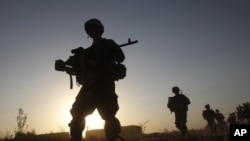President Barack Obama plans to complete the withdrawal of 33,000 troops from Afghanistan by September, 2012. But under the president's plan, some 68,000 troops - more than twice the number that were there when Obama took office - will remain until at least 2014. The looming troop drawdown has reignited a strategic debate in the United States over its approach in Afghanistan and Pakistan.
After the president announced the pullout of the 33,000 surge troops, U.S. Senator Bob Casey, chairman of the Senate Foreign Relations Subcommittee dealing with South Asian affairs, issued a statement saying that the U.S. should shift from a strategy of counterinsurgency toward an increased focus on counterterrorism.
The counterinsurgency vs. counterterrorism debate raged in Obama’s policy circle when an Afghan strategy was being hammered out in 2009. Some advisors, particularly the military, favored counterinsurgency, a troop-heavy approach with a parallel emphasis on reconstruction and “winning hearts and minds.” Others, led by Vice-President Joe Biden, argued for a narrower counterterrorism program using a limited number of special operations forces focused just on attacking al-Qaida and its allies, including the Taliban, and less nation-building. Obama eventually came down on the side of counterinsurgency and ordered in the additional troops.
Michael O’Hanlon, a senior fellow at the Brookings Institution, says that moving too far away from counterinsurgency now is a chancy move.
"I think the notion of going primarily to counterterrorism doesn’t work," said O’Hanlon. "Now, can you change the mix [of conventional and special forces]? Or, can you hope to go to counterterrorism in the future as the Afghans gain the capability to provide that human intelligence and population protection? Yes. But, the pace matters a lot, and it has to be part of a careful plan. What the president essentially did was to throw away the existing plan, in the hope that commanders can make a new one in the face of this much more rapid drawdown. I wish him well - I wish them all well - but it’s going to be risky."
Stephen Biddle, a fellow at the Council on Foreign Relations, says the primary risk for the U.S. is that too hasty a withdrawal could cause the fall of the Afghan government, which he says could create instability along the Afghan-Pakistan border and increase the risk of Pakistan’s nuclear weapons falling into terrorist hands.
"The issue is whether the return of Afghanistan to 1990s-style anarchy that is likely to result has downstream [future] consequences that hurt us, either because al-Qaida re-establishes bases in Afghanistan - which I actually think is the less consequential of the dangers - or because chaos on Pakistan’s western border destabilizes Pakistan," said Biddle.
Officials say the remaining 68,000 troops, along with other members of the international coalition, will keep the military pressure on the Taliban while continuing to train Afghan army and police to take over security duties by 2014.
On a track parallel to the military operations, moves toward a political settlement are underway. President Obama says the U.S. will back any peace initiatives, but they have to be led by the Afghan government.
"As we strengthen the Afghan government and security forces, America will join initiatives that reconcile the Afghan people, including the Taliban," said President Obama. "Our position on these talks is clear: they must be led by the Afghan government, and those who want to be a part of a peaceful Afghanistan must break from al-Qaida, abandon violence, and abide by the Afghan constitution."
But former Afghan ambassador to the United States Said Jawad says the Taliban will not deal unless the U.S. is involved.
"My experience indicated that every time emissaries would go to Taliban or Taliban would send their guys to talk with the Afghan government, the first question they ask is, does America know about this reconciliation? And if the answer is no, then Taliban are not interested," said Jawad. "They walk away. And the reason is that they know who they’re fighting with. So if there’s a reconciliation they want to do it with the party that’s mostly involved in it."
Secretary of State Hillary Clinton called the Taliban outreach “not a pleasant business but a necessary one.” But officials and outside analysts say the overtures are very preliminary. Ambassador Jawad describes them as “talks about talks” and warns against any premature expectations of results.
Afghan Drawdown Leaves Unanswered Questions
- By Gary Thomas




